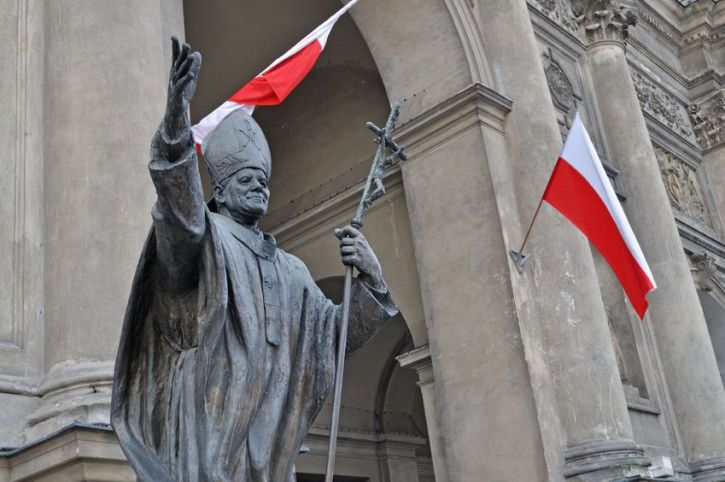The European Dream: “We Must Go Deeper”
Maneuverings now taking place in the EU are moving toward an ever-closer political and religious European superstate. What does the Bible predict?
A monument of Pope John Paul II stands outside The Church of All Saints in Warsaw, Poland.
Without any doubt, he had the unification of Europe and the revival of the Holy Roman Empire on his mind, as do his two living successors. John Paul II’s successor, Pope Benedict XVI, quoted and reinforced this statement in a July 24, 2005, speech.
Going deeper
A few years earlier, in 1979 while visiting the country of his birth, the Polish pope declared, “Europe, despite its … regimes, ideologies and economic systems cannot cease to seek its fundamental unity and must return to [Roman Catholic] Christianity. … Economic and political reasons alone cannot do it. We must go deeper” (emphasis added throughout).
And even back in 1975 Pope Paul VI, addressing the bishops of Europe, said: “Can it not be said that it is faith, the Christian faith, the Catholic faith, that made Europe? … And it is there that our mission as bishops in Europe takes on a gripping perspective. No other human force in Europe can render the service that is confided to us, promoters of the faith, to reawaken Europe’s Christian soul where its unity is rooted.”
He went on to say that the Catholic faith was “the secret of Europe’s identity,” and when the secret was discovered, Europe could carry out “the providential service to which God is still calling it.”
The skeptical British
But despite the “European dream” expressed by many throughout history, the last few years have presented challenges to the dream of a united Europe. Presently Britain, in particular, is increasingly backtracking from greater participation in a more unified Europe. (As I write, the British Parliament is arguing about a bill to guarantee the people a referendum on staying in or leaving the EU.)
The recent successes by the United Kingdom Independence Party (UKIP) in local elections must have sent shock waves through the other main political parties who are, in the main, pro-European. The relatively new party came from almost nowhere and took 25 percent of the vote.
UKIP does not want to see Britain moving ever closer to the EU. On the contrary, it is very skeptical concerning the ever-closer relationship between member states. UKIP is the outcome of decades of the British public’s increasing discontentment with an ever-closer move toward Europe, and it certainly does not want to be part of what it sees as a future United States of Europe.
Students of the Bible should not be surprised at the continuing division between Britain and the European Union. Prophecy indicates Britain will not be a part of the final European “beast” power.
The intrusive EU
UKIP’s views are not new, nor are they unique. Former British Prime Minister Margaret Thatcher, in a 1988 speech to the College of Europe, said: “We have not successfully rolled back the frontiers of the state in Britain, only to see them re-imposed at a European level with a European super-state.”
In March of this year, speaking at the Heritage Foundation, journalist and political commentator Charles Moore said, “If the EU continues to increase its role in member nations’ affairs, it will soon resemble a national government. But unlike the federal government created in the American founding, which developed with democratic consent and bottom-up involvement from the citizens of the independent states, this new European ‘super-state’ is being thrust top-down upon Europeans and undermining their national sovereignty.”
The ever-closer links
Lady Thatcher’s and Mr. Moore’s comments are anathema to the other side of the argument—those Europeans who want ever-closer links within the European Union.
Some are even urging Germany to be the forerunner and seize every opportunity for unification before there is an implosion of the EU due to the current dire financial situation. For example, the Polish defense secretary Radek Sikorski would like Germany to seize the initiative before the EU collapses completely.
However, like Britain, some other European states are not so keen on growing German power and the ever-closer links.
Germanphobia
Brendan Simms, professor of the history of European international relations at Cambridge and author of Europe: The Struggle for Supremacy, From 1453 to the Present, wrote:
“Anti-German sentiment is growing exponentially in southern Europe, especially Greece and Spain, whose peoples are rebelling against the austerity regime supported by Germany. More recently, Germanphobia resurfaced in France. In Paris, the socialist senator Marie-Noelle Lienemann invokes the spirit of … Free French leader General Charles de Gaulle against German suggestions. …
“Even where it is not so explicit, much of the rhetoric against a ‘German Europe’ draws on memories of Hitler’s attempts to control the entire continent 70 years ago” (London Evening Standard, April 29, 2013).
The prophesied outcome
The outcome of the struggle within Europe will be the rise of a 10-nation (or groups of nations) political union within Europe. This European superpower will likely be led by a German political leader in league with the Vatican (Revelation 17:3, 12-13). It will be a power to be reckoned with!
However, it will be a short-lived power. What comes next?
Please click on the following links to read about the return of Jesus Christ and the arrival of what He passionately prayed for: that the Kingdom of God would come to earth (Matthew 6:10).
Date Posted: May 17, 2013

